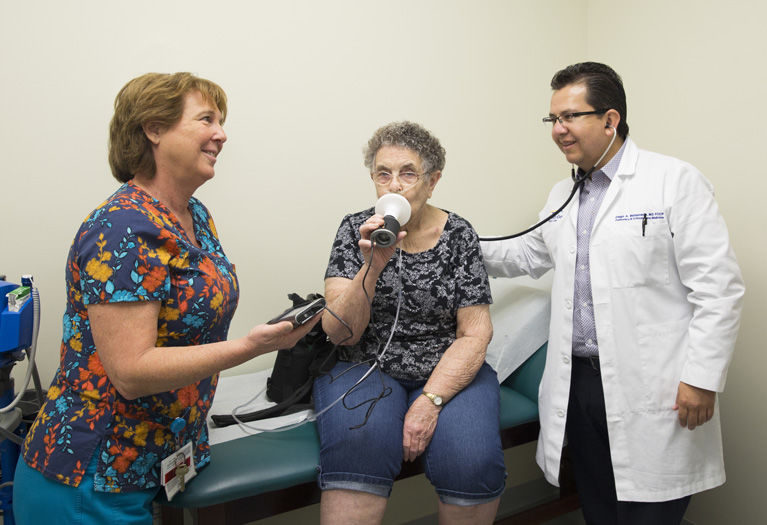
78-year-old Vero resident Ruby Mitchell has a serious respiratory disease known as “idiopathic pulmonary fibrosis.”
There is no cure.
For quite a while, Mitchell was wheelchair-bound due to this breath-stealing disease, but with the help of Dr. Diego Maldonado and Karen Bleakley of the Indian River Medical Center’s pulmonary rehabilitation team, she’s managed to improve her mobility and function so much that she’s now joining her daughter for a weekend getaway to Clearwater.
To say that idiopathic pulmonary fibrosis is complex is a gross understatement.
The abridged version might go something like this: The alveoli – tiny air sacs deep inside the lungs – and surrounding lung tissues become hard, scarred and fibrous, losing the ability to absorb oxygen and pass it on to the rest of the body.
The most obvious immediate symptom is shortness of breath but, according to the American Lung Foundations, the condition “can lead to other medical problems, including collapsed lung, lung infections, blood clots in the lungs and lung cancer. It can also lead to respiratory failure, pulmonary hypertension and heart failure.”
And yet, no one knows what actually causes this disease, which is why the term “idiopathic” is used: The word denotes a disease or condition which appears to arise spontaneously for which there is no known cause or trigger.
There has been a laundry list of potential causes suggested over the years, including lung tissue inflammation, exposure to radiation, exposure to cigarette smoke, exposure to asbestos, ingestion of certain chemotherapy and heart drugs and some antibiotics, but no definitive root cause has yet been found.
What Maldonado, who is board certified in critical care medicine, internal medicine and pulmonary diseases, has been able to do for Mitchell is to accurately diagnose the problem and, using new medications, help slow the progression of the disease.
Diagnosis can be challenging.
The American Lung Foundation reports that about 140,000 Americans are diagnosed with idiopathic pulmonary fibrosis each year, but Maldonado thinks that number may not include all those with the disease.
“I think it’s probably under-diagnosed,” he says. “With just a simple X-ray or a simple CAT scan you couldn’t see it but with high-res CT scans we can.”
Meanwhile, according to Maldonado, a new drug that just hit the market in 2015, nintedanib, is showing some promise in helping to slow the progression of the disease.
That’s significant for patients like Mitchell who may not be good candidates for lung transplants.
The American Lung Foundation says the disease mostly affects people in the 50 to 75 age bracket, but Maldonado points out that many transplant centers won’t undertake lung transplants on patients over 62 or 63 years of age.
Moreover, Maldonado calls lung transplantation “the most imperfect organ transplant” adding that only half of such transplants succeed.
Meanwhile, Bleakley and the pulmonary rehab team have been working with Mitchell, too.
“If a patient can maintain some sort of activity,” Bleakley claims, “it can help slow the progression. It doesn’t cure it, but hopefully if you get sick – say you came down with a bad cold or you were put in a hospital – it hopefully will shorten your stay because you have a higher level of fitness.
“What happens with people with lung disease,” Bleakley continues, “is they get short of breath with activity so they stop doing the activity. We try to get them to a higher level of function – even though they’re still going to have shortness of breath – but at least their daily living continues. I don’t expect them to run marathons or walk a mile or run, or whatever. I just try to keep them level.”
The overall prognosis for patients not receiving treatment for IPF isn’t good.
“Without treatment,” states Maldonado, “the five-year survival rate is only 30 percent,” which means 70 percent will die within that five-year window.
While newer drugs are showing promise at slowing the course of the disease, there’s no long-term data on them yet.
In the meantime, portable oxygen therapy, continued monitoring by physicians like Maldonado and the work of pulmonary rehab experts such as Bleakley remain the best hope for Ruby Mitchell and other victims of the disease to be able to squeeze more weekend getaways and everyday activities into their lives.
Dr. Diego Maldonado is with Indian River Medical Associates at 1155 35th Lane, Suite 201 in Vero Beach. The phone number is 772-794-5800. The IRMC pulmonary rehab program is at 959 37th Place. The phone is 772-567-4311.



